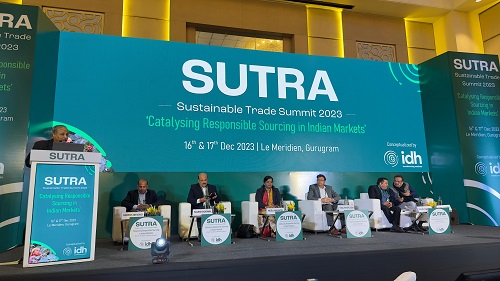
The Sustainable Trade Summit (SUTRA) 2023, held on 16 and 17 December at Le Meridien, Gurugram, focused on responsible sourcing in Indian markets. This event, spearheaded by IDH, brought together industry leaders, policymakers, and experts to discuss and formulate solutions for the challenges faced in agri-commodity value chains, with a special focus on uplifting smallholder farmers.
The summit was a hub for discussions on sustainable trade, biodiversity conservation, sustainable manufacturing, and the pivotal role of gender in sustainable supply chains. SUTRA 2023 set a precedent for future collaborations between businesses, governments, and civil societies, reinforcing the commitment to sustainable trade practices and manufacturing.
In the contemporary landscape, there has been a notable shift in perspective, underscoring the essential interconnection between business and sustainability. This transformation reflects a shared understanding among businesses, governments, and civil society organizations that the efficacy of a business hinges on the integration of sustainability at its core. This emphasis is particularly critical in the realm of agricultural commodities and their associated value chains, where a significant portion of food production is carried out by smallholder farmers.
Speaking at the event, Neelam Patel, Senior advisor at Niti Aayog, emphasized the pivotal role of the agriculture and allied sector, “Agriculture is of paramount importance in India, with over 50% of people depending on this sector. While Indian agricultural practices are predominantly sustainable, there is room for enhancement. The government is actively engaged in promoting sustainable agriculture through initiatives such as providing soil health cards, establishing custom hiring centers for farm machinery, and enhancing accessibility to quality seeds. Additionally, the government is championing Farmer Producer Organization (FPO) models to bolster farmers’ bargaining power, advocating for natural farming, and facilitating training and skilling programs for farmers. It’s a collaborative effort to further refine and fortify the sustainability of our agricultural practices.”
Rajesh Agarwal, joint secretary at the Ministry of Commerce, said, “Every country has its unique sustainability journey and requirements. Achieving equity in this transition is crucial, and consumer awareness is key. Continuous dialogue on the sourcing of sustainable products is vital. As we strive to reach Net Zero by 2070, it’s imperative to acknowledge that we contribute 40% of greenhouse gas emissions globally. This demands substantial investment and capacity building. Natural farming emerges as a strategy, and small and marginal farmers have the potential to transition towards sustainability. It’s about fostering a collaborative and voluntary transition for a sustainable future.”
Expanding on the discourse during the event, with a specific focus on the Palm oil sector, Sanjeev Asthana, CEO of Patanjali Foods, remarked, “The palm oil landscape in India faces a significant challenge, given that 90% of the Palm oil is imported. Achieving 100% sustainability and traceability in the supply chain proves to be a complex undertaking. While we are implementing best practices concerning water usage and integrated pest management in our Indian plantations, the broader sector grapples with substantial challenges. To address this, it is imperative to construct a comprehensive narrative that involves active participation from all stakeholders, including Civil Society Organizations (CSOs), NGOs, and other industry players.”
Reflecting on the event, IDH India Country director – Jagjeet Singh Kandal said, “SUTRA 2023 marks a pivotal moment in our collective journey towards sustainable and responsible sourcing in Indian markets. I am inspired by the collaborative spirit exhibited at the summit, where industry leaders, policymakers, and experts joined forces to address the challenges within agri-commodity value chains. As IDH, we remain committed to fostering collective action, working hand-in-hand with these stakeholders to realize a future where responsible sourcing converges harmoniously to shape a more sustainable and equitable world. Together, we are steering the course towards positive change towards improved livelihoods, environmental stewardship, and gender equality within our agricultural landscapes.”
IDH serves as a convener, bringing together businesses, governments, and civil society organizations to facilitate joint actions. Our focus is on fostering collaboration to address issues and challenges in agri-commodity value chains, promoting concerted grassroots efforts for improved income, better jobs, a healthier environment, and gender equality.
IndiFoodBev — authentic, impactful and influential
An English-language food and beverage processing and packaging industry B2B platform in print and web, IndiFoodBev is in its third year of publication. It is said that the Indian food and beverage industries represent approximately US$ 900 billion in revenues which implies more than 20% of the country’s GDP. Eliminating the wastage on the farmside can help to deliver more protein to a higher number of the population apart from generating sizable exports. The savings in soil, seeds, water, fertilizer, energy and ultimately food and nutrition could be the most immense contribution that country is poised to make to the moderation of climate change.
To improve your marketing and grow sales to the food and beverage processing and packaging industry, talk to us. Our research and consulting company IppStar [www.ippstar.org] can assess your potential and addressable markets in light of the competition. We can discuss marketing, communication, and sales strategies for market entry and growth.
Suppliers and service providers with a strategy and budget for targeted marketing can discuss using our hybrid print, web, video, and social media channels to create brand recognition linked to market relevance. Our technical writers are ready to meet you and your customers for content.
The second largest producer of fruit and vegetables in the world is continuously expanding processing capacities and delivery systems with appropriate innovative technologies. We cover product and consumer trends, nutrition, processing, research, equipment and packaging from farm to thali. Get our 2025 media kit and recalibrate your role in this dynamic market. Enhance your visibility and relevance to existing markets and turn potential customers into conversations. Ask for a sample copy of our bi-monthly in print or our weekly IndiFoodBev eZine each Wednesday.
For editorial info@ippgroup.in — for advertisement ads1@ippgroup.in and for subscriptions subscription@ippgroup.in
Naresh Khanna – 10 February 2025
Subscribe Now










